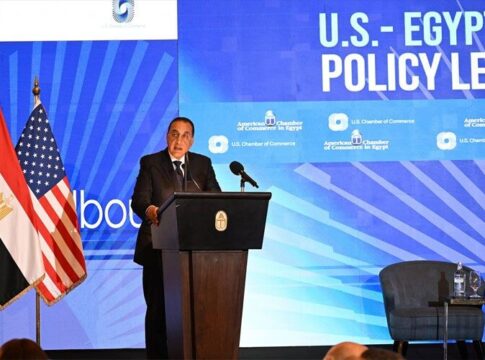At the Egypt–U.S. Policy Leaders Forum 2025, held this week in Cairo, Egyptian Prime Minister Dr. Mostafa Madbouly delivered a bold pitch to the American business community, inviting U.S. investors to take advantage of Egypt’s expanding, reform-driven economy and strategic geographic positioning.
Speaking before a high-profile audience of policymakers, business executives, and diplomats, Madbouly unveiled a sweeping update on Egypt’s economic liberalization efforts, emphasizing that Egypt is now at the final stages of completing a bilateral customs agreement with the United States. This, he said, will further streamline trade, eliminate bureaucratic hurdles, and signal a new chapter in U.S.-Egypt economic cooperation.
“Our market is now more open, transparent, and competitive than ever before. This is the time for American businesses to invest, expand, and co-create in Egypt,” the Prime Minister said at the event hosted by the American Chamber of Commerce in Egypt.
Madbouly highlighted the deep-rooted economic ties between the two nations, noting that over 1,800 American companies operate in Egypt, with cumulative investments exceeding $47 billion in the last two decades. The momentum, he said, is only growing.
As part of the reforms, Egypt issued a decree this month eliminating compliance with local production standards for U.S.-made vehicles, easing their entry into the Egyptian market. The decree has already been submitted to the World Trade Organization.
Equally impactful, U.S. dairy products and derivatives will now be permanently exempt from halal certification requirements, effective March 12, 2025. Until then, they can be exported without fees or certification, a major boost for American agricultural exporters.
These announcements build on broader reforms aimed at reducing state dominance and empowering the private sector. Madbouly reiterated his government’s commitment to the State Ownership Policy Document and the Golden License system, which accelerates approvals for strategic investments in key sectors.
Dr. Rania Al-Mashat, Minister of International Cooperation, described the initiatives as transformative: “Egypt is no longer just open for business — it is competing for it,”.
Hossam Heiba, CEO of the General Authority for Investment and Free Zones (GAFI), added that the Authority is prioritizing Golden Licenses for American companies in industrial, healthcare, logistics, tourism, and IT sectors. “We’re preparing new incentive packages, particularly in automotive, green hydrogen, and waste management,” Heiba told Economy of the East with Bloomberg.
In support of U.S. exporters, Minister of Investment and Foreign Trade Hassan Al-Khatib revealed that the government plans to slash halal conformity assessment fees by 30–50%. Cabinet Spokesman Counselor Mohamed El-Homsany confirmed that halal certification will apply only to meat, permanently exempting dairy products. He also noted that Egypt’s Ministry of Agriculture will accredit multiple certificate-issuing firms, a move intended to increase competition and reduce monopolistic practices.
Madbouly also outlined Egypt’s push to digitize government services, modernize trade, and embrace frontier technologies. Egypt’s National Digital Strategy is driving the integration of AI, blockchain, and big data into sectors ranging from health to logistics.
With a young, skilled labor force of over 110 million consumers and regional access across Africa, Europe, and the Gulf, Egypt is positioning itself as a future-ready production and innovation hub. “We are not just preparing for the future,” Madbouly said, “we are building it.”
According to government sources cited by Economy of the East with Bloomberg, Egypt aims to boost exports to the U.S. by 10% this year, reaching $2.47 billion. Meanwhile, 50 U.S. companies have expressed interest in investing in Egypt in 2025 alone, said Omar Mehanna, Chairman of the Egyptian-American Business Council. Fields include renewable energy, tech, and advanced manufacturing.
“Some companies have already taken concrete steps, while others are still negotiating,” Mehanna told Al Borsa. He added that Egypt’s strategic location and economic reforms make it increasingly attractive for U.S. firms looking for reliable international growth markets.
Beyond economics, Madbouly’s remarks carried diplomatic resonance. He framed U.S.-Egypt relations as key to regional stability. “We cannot solve global challenges — from energy security to forced migration — without collaborative leadership,” he emphasized.
Dr. Khaled El Shamy, a Cairo-based political economist, said: “With regional volatility increasing, Egypt offers Washington both a commercial ally and a stabilizing diplomatic partner. That combination is unique and increasingly valuable.”
Egypt is making a calculated, confident play to position itself as the Middle East’s most investor-friendly economy. With new regulations, robust infrastructure, and a digital pivot underway, Cairo’s message to Washington is unmistakable: We are ready. Let’s build the future together..


